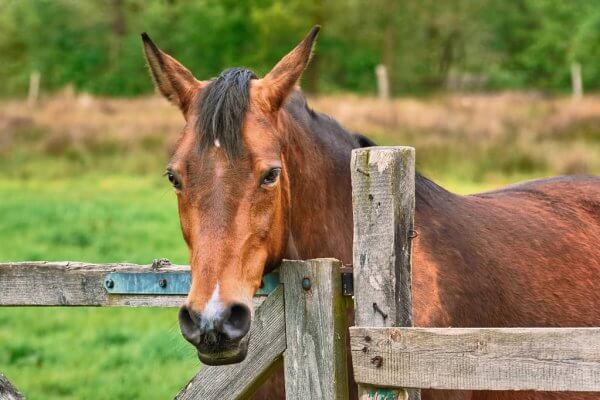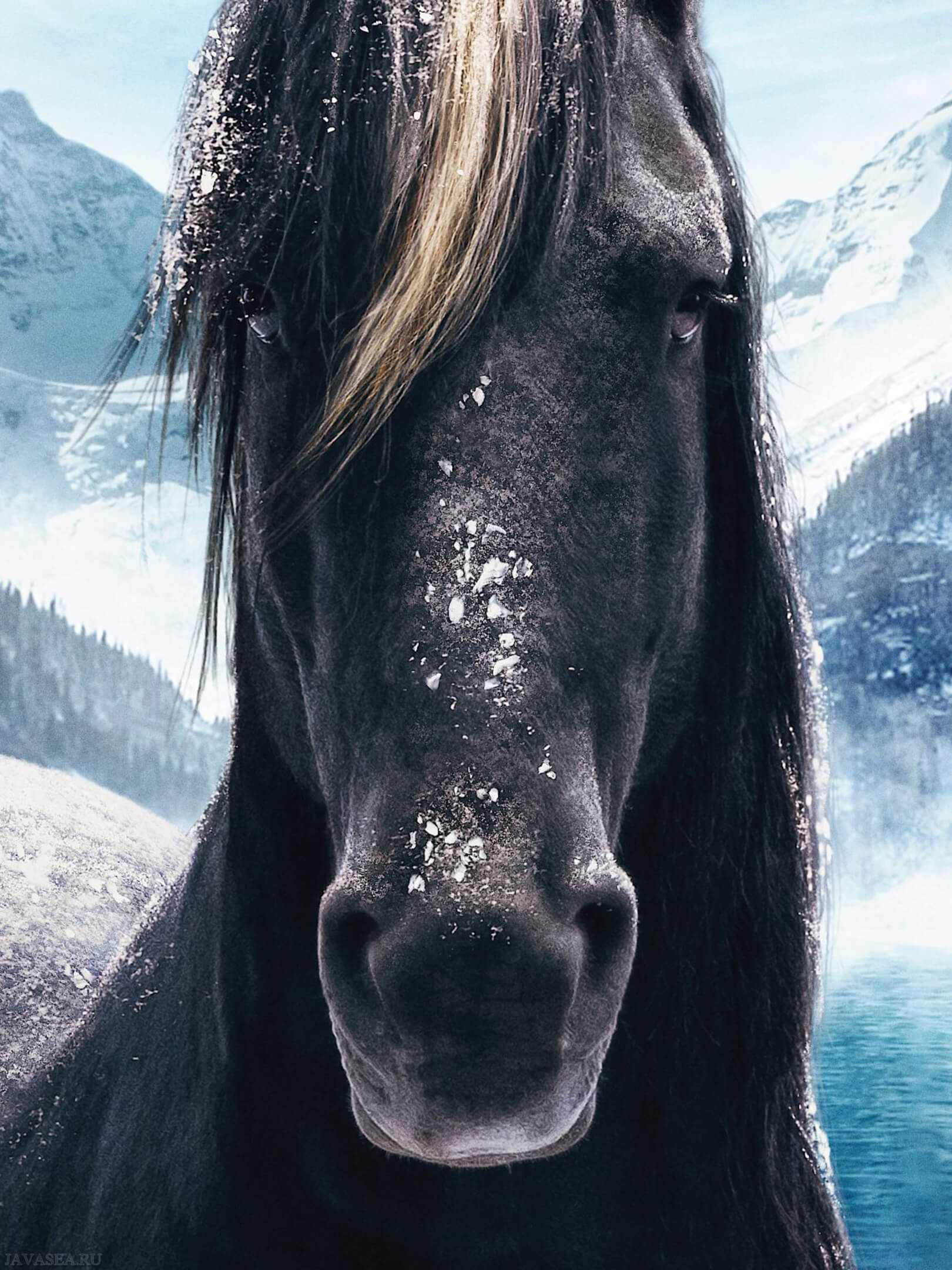For the owner, it is annoying at first glance, but for the animal, it can also be a symptom of a serious illness: horse stool is not to be joked with. But what is it actually and how does it differ from diarrhea? What are the possible causes and how can they be treated? We clarify!
What is Fecal Water in a Horse?

First of all, we want to dedicate ourselves to the symptoms of the droppings. Because this phenomenon needs to be clearly differentiated from diarrhea. In the case of diarrhea, the horse droppings are not shaped, the droppings are rather mushy, or even watery heels. However, this is always a homogeneous mass.
Fecal water, on the other hand, is an (often discolored) liquid that is released separately from the feces. It can occur before or after weaning, as well as completely independently of it. Basically, however, both diarrhea and fecal water in horses are signs that gastrointestinal health is impaired.
It is quite normal to have some fluid in the bowel. This is usually added to the manure, which gives it its typical consistency. If, on the other hand, these processes are disturbed and cannot take place, as usual, either fecal water and/or diarrhea can result.
Causes: These are the Triggers
If you have noticed that your horse has feces, you should investigate the cause. Because this is always a symptom and not an independent disease. It is important that you have a little patience. In most cases, the gastrointestinal tract calms down after a few days. However, if the problem persists for more than a week, you should contact the veterinarian.
Stress is the Main Cause of Fecal Water
You may know it from yourself: Stress often affects the stomach as well. Because the increased tension often produces an excess of stomach acid. This can lead to various symptoms such as abdominal pain, diarrhea, and fecal water in the horse.
So if you know that your animal is currently confronted with extraordinary stress, then that is usually the cause of fecal water. So is a tournament coming up, have you moved or changed the stable, has a new caregiver come into play? All of these can be triggers.
If this is the case, it means one thing above all for you: wait and see. As a rule, gastrointestinal health returns as soon as you get used to it or as the situation passes. Would you like to know how you can give your animal additional support during this time or how you can recognize stress in horses? Then read on about this in our article.
Focus on Nutrition
If something is wrong with the feed, it quickly affects the horse’s gastrointestinal health. Such malnutrition can occur at different levels. A first hint is, of course, a very thin or thick appearance – we explain how you can recognize this in our article on horse weight. But other clues also play a role:
- Poor hoof growth;
- Hardly any hair growth;
- The slow change of coat;
- Tarnished legs.
The symptoms described above, together with fecal water in horses, can indicate a nutritional deficiency. Check the food in detail here and see whether all the important minerals and vitamins are adequately covered. Have you just changed the feed? Then this can also be the trigger for the leakage of the liquid.
However, the poor quality of feed can also be the cause of fecal water in horses. Musty, damp hay is often a paradise for fungi and bacteria. These disrupt the gastrointestinal flora. So it is best to check very intensively whether your feed is really still good.
Irritation of the Stomach and Intestines
It is not only the feed quality that has an impact on gastrointestinal health. There are also a few other factors that can interfere with this and thus trigger fecal water. For example, long breaks in eating are harmful to the horse’s body, as this species is one of the permanent eaters. Gastritis and stomach ulcers can also be the cause.
But how do you know if your horse has gastrointestinal problems? We have summarized the most important symptoms here – in addition to the droppings. If you notice any of these, it is best to have your vet do a blood count to clarify any possibility:
- Fatigue
- Lethargy
- Inflate
- Underweight
- Aggressiveness
- Lack of rideability
- Dull fur
- Soft hooves
By the way: A good indication of whether it is a feed problem or another cause is to look at all the horses in a herd. If everyone receives the same food and only one shows abnormalities, the food is rarely to blame. Once you have clarified all the factors with your veterinarian, he or she may suggest an intestinal rehabilitation. We have highlighted what you have to pay attention to in another text.
Dental Problems Lead to Fecal Water
It might sound abstract at first, but what happens at one end of the body also has an impact on the opposite. And so it is not uncommon for toothaches to lead to fecal water. If the animal has pain in the mouth area, this can mean that it is basically malnourished and does not take in enough nutrients. This means that the symptoms described above usually also occur.
As with us humans, a toothache can have very different causes. In young horses, for example, switching between milk teeth and permanent teeth often leads to problems. Also, plaque and tartar are not alien to horses. Bad tooth structure, especially in the elderly, can cause inflammation that has an impact on overall health. This can be recognized by the following symptoms:
- Excessive salivation;
- Heavy smacking;
- Bad breath;
- Swelling in the mouth area;
- Feed particles in the feces;
- Sensitivity to the head (especially when treading on);
- Lack of rideability.
Other Causes of Fecal Water in Horses

Have you excluded the causes mentioned above and does the fecal water still occur consistently? Then other factors can also play a role. We would like to briefly discuss some of them at this point:
- Foreign bodies: If the horse ingests too much sand or other foreign bodies while grazing, these can irritate the sensitive mucous membranes.
- Poisoning: If there are poisonous plants in the pasture or if too much mineral feed is given, the poisoning can cause the horse to drain its feces. In an earlier article, we looked at what you should look out for when it comes to the horse pasture.
- Lack of exercise: In nature, horses cover several kilometers a day and the organism is designed for this. If there is no movement, unused fluid collects in the intestine, which is excreted as fecal water.
- Parasites: A worm infestation can cause inflammation in the gastrointestinal tract and thereby cause fecal water in the horse.
- Hormonal changes: Mares who are horsey and stallions who behave as stallions can defecate due to the hormones.
With all these causes, it is important that you do not just treat them yourself, but always contact your veterinarian (or, if necessary, a specialist). With the appropriate tests, they can identify the exact trigger and advise you on the best therapy.
Treating Fecal Water: What to Do?
We have already indicated, but since fecal water is not a disease in itself, but a symptom, the underlying cause must always be treated as well. That should be the focus of every therapy. Nonetheless, you can of course use certain means to influence the consistency of the feces to a certain extent.
Well-known home remedies for horse stool water include horse hemp, flea seeds (husks), and brewer’s yeast. Various herbs that have a calming effect on the gastrointestinal tract can also be used. These include, for example, peppermint, fennel, caraway, dandelion, and chamomile.
However, the change of feed itself can also result in fecal water. After all, it always puts a strain on the digestive tract. If you observe that the symptom worsens, it is best to consult your vet.
Consequences of Fecal Water on Horses
It is important that the causes of fecal water are addressed as quickly and carefully as possible. Because if it occurs over a long period of time, it can lead to more serious problems. On the one hand, of course, the disease that is the cause should be treated.
On the other hand, the stool itself also causes damage to the horse. Because it often runs down the legs starting from the anus and settles in the gap between the thighs. Here the thighs rub against each other and the additional irritation from the fecal water can quickly lead to dermatitis (i.e. skin inflammations).
So if you discover that your horse is getting stool, it is important to take a closer look at the problem. If it has not returned after a few days, it is best to call the vet. Because even if mostly harmless, temporary factors such as stress are the cause, more serious illnesses can also be the cause. That should definitely be clarified.

